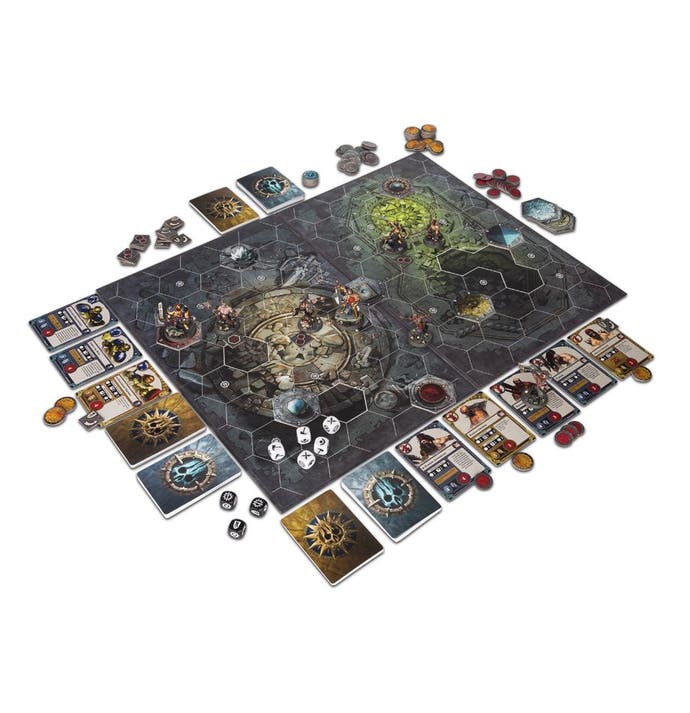Meet the Warhammer property screaming out for a video game version
Warband of gold.
If there's anything that can be said of Games Workshop of late, it's that it hasn't shied away from licensing video games - a trend that was lampooned far better than I could ever aspire to by this article.
With so many studios involved in bringing one company's creative vision to life, it should come as no surprise that the quality of these games is somewhat inconsistent. Warhammer: Vermintide 2 is tremendous sequel to an already great game, for example; Bloodbowl 2 is rough around the edges but otherwise a pretty faithful recreation of its tabletop counterpart; the Horus Heresy game currently in steam early access, meanwhile, looks kind of bobbins.
Bearing all this in mind, it feels counterintuitive to write an article urging Games Workshop to license Yet Another of its properties out to a video game developer, and yet I think there's a Warhammer property screaming for a digital release, and that game is Shadespire.
Shadespire, for those who aren't in the know, is a tabletop game launched by Games Workshop in 2017. It's a game for two, three or four players in which different warbands - teams, if you prefer - do battle for control of a number of objectives, for the joy of killing the enemy team, and for the reward of smart strategic play. So far, so Warhammer, you might think, but there are certain aspects to Shadespire that make it more like a video game than any Games Workshop property seen before.

First and foremost, the battleground in Shadespire is not measured in inches, but hexes; each model has its own name, its own weapon, its own health pool and its own movement characteristics. Each player, meanwhile, has four tokens - each representing an action undertaken by their warband. These tokens are used up in turn so, while I might use my first activation to move one of my Stormcast Eternals to take an objective point, you might use your first activation to charge one of my other figures. On a good combat roll (depending on your warband) this might result in a grievous wound or even a kill but, seeing that a figure cannot be activated again after a charge, the character that just completed the charge is now left wide open.
Hopefully from this example you can see that there is a strong chess element to Shadespire. As compelling as its hex-based combat can be, however, that's not the only reason it can be considered a good candidate for a video game port. Did somebody say deck building? They did not, but I'm saying it now in order to keep this article moving.
Deck building!
That's better. So Shadespire, as it turns out, is a pretty card-heavy game. One scores points not only by killing enemy characters (a point for each one slain, thank you very much), but by scoring objective cards. Each player holds three of these at a time, trading them in for victory points either at the end of each of the game's three battle rounds or otherwise at the moment the cards themselves dictate. In addition to these cards, the players wield a hand of Ploys; these take the form of action cards or upgrade cards. At the end of each activation, both players get the chance to play Ploy cards until both players have passed - although it should be noted that one needs to have victory points in order to play an upgrade card. Once both players have managed all the mischief they can with their given hand and circumstances, the action passes to the next player, whose activation it is.
It's a game, in other words, that has a significant chess element and a pronounced deck building metagame. Games Workshop has not been idle in terms of expanding the Shadespire core set, either; at the time of writing there are four warbands available for the game in addition to the two bundled in the core set, with each new warband packing a number of miniatures necessary to represent that faction and, more importantly, 60 new cards aimed at introducing that new faction and bolstering other, existing ones. In other words the pressure is on, for anybody hoping to play Shadespire competitively, to buy all the warbands or else lose out on having the right cards to win the day. Of course this is the issue on which the hypothetical video game port pivots, because how do you control access to these cards? Do you make packs available through play a la Hearthstone, or do you charge for card packs, a la Hearthstone?
To be honest, that's for people with a much grander salary than me to figure out but, given the hex-based combat, deck building and faction loyalty, hopefully you can see why Shadespire is a good fit for a video game. Hey, a sepulchral guard can dream, right?

